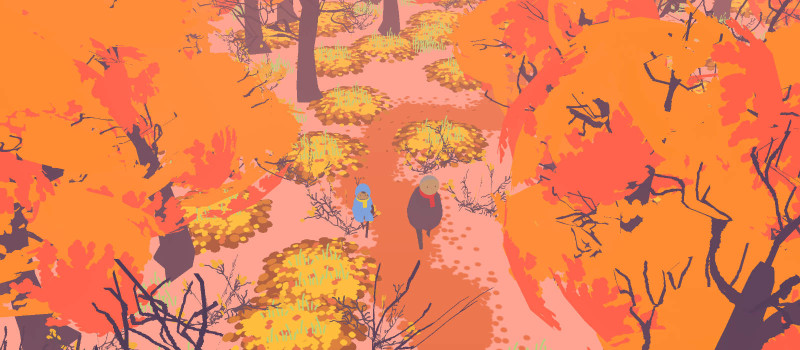Lieve Oma
Meaning “Dear Granny” in Dutch, Lieve Oma is a game about taking a walk with your grandmother on a beautiful autumn day. Playing as a little kid that’s excited to go mushroom hunting, you run around the forest to collect them. After a while the grandmother asks about how the kid feels about certain life events, such as attending a new school.
Through simple but heartfelt dialogue, designer Florian Veltman creates a warm connection between the player and the grandmother, making it feel like you’re on a stroll with your own grandparent. Later, an older version of the boy is seen roaming the same forest. Autumn has turned to winter. There’s no mushrooms, and no grandmother.
Lieve Oma is a short, emotional experience that will remind you to cherish your loved ones, as you never know when they could be gone.
About the developer
After being nominated for an IGF Award for Lieve Oma, Dutch game designer Florian Veltman joined Ustwo Games, where they worked on Monument Valley 2 and Assemble With Care. They’re currently developing How To Say Goodbye, a game about coping with loss and grief inspired by children’s illustrations.

Interview with Florian Veltman
It’s been over five years since you created Lieve Oma. Do people often still talk to you about the game?
It’s the project that started my career in any case. It’s the first game that won prizes and with which I gained visibility I didn’t have before. It’s also the game that got me in touch with ustwo, where I worked on Monument Valley 2 and Assemble With Care.
Your current project How To Say Goodbye is quite literally about letting go. Lieve Oma also features that theme. What is it about farewells that draws you to them?
Yes, that has become somewhat of a common thread in my work. It’s often about saying goodbye, departing this life and the questions that arise from that. I’m not quite sure why exactly I’m drawn to those topics. Loss is always difficult to deal with so maybe this is my way of coping with that.
There’s also the colorful, almost dreamy visuals in opposition to the more serious tone of the story.
I really like to create experiences that speak to people on a visual level, especially for those who aren’t interested in the gameplay per se. That way I ease new players into the field so they might discover stuff they do like. Through heavier subject matter I want to illustrate that video games can be more than just mere entertainment.
Do you think Lieve Oma has been played more by traditional gamers than people who aren’t into video games?
I can’t say that for sure, but if I had to take a guess I’d say it has been played more by traditional video game players, as it’s really hard to reach these other people. Monument Valley was able to do that, but that’s a rare outlier. I do like to play with that dichotomy though. For instance, at the start of Lieve Oma players have to collect mushrooms, which is a very videogamey thing to do. The idea behind that is to offer video game players a familiar mechanic to get into the game, so they will be able to better engage with the story later on.
Did you anticipate Lieve Oma to be a powerful emotional experience. Because that’s certainly how we experienced it.
I’m glad to hear that, because it was certainly my goal. Initially, I toyed with the idea of offering various conversation options. Players would be able to choose what they wanted to talk to their grandmother about. I gradually realized those choices made the overall story less strong. By focusing on a specific issue the story became more clear. While I was writing that story I thought that, if people wouldn’t find the game too exhausting to play, it might touch a nerve or two.
Spoiler warning: the second part of the game is set during winter and doesn’t feature the grandmother. Did you want to think players she had died?
In a lot of video games and other media the death of a character is communicated that way, so I thought it would be interesting to flip that around. The sole goal of the game was to give players a moment of relief, some breathing space. I created the game in 2016 and while there was a lot going on in the world, I was sitting behind my computer creating these little games. So I sought to create video games where people could find a bit of solace or feel better after playing it. Having a hot cup of coffee with your gran, that was the feeling I was aiming for.
Is the grandmother in the game based on your own grandmother?
That’s right: it’s an autobiogra phical portrayal of my grandmother, but we didn’t go mushroom hunting together when I was a kid. It’s not a Dutch habit, but in France it’s very common to do this together with your grandparents. I immediately found the idea appealing and thought it could hold some kind of game mechanic. I combined that with a story about my own grandmother.
There’s another game (Brukel) on show that’s based on the memories of a grandmother. What makes this such a special person in our lives?
This will vary from person to person, but for me my grandmother took care of me at times my parents didn’t have time for their children. That’s the main reason she became very important to me. On top of that, grandparents don’t carry the responsibility to raise their grandchildren, they don’t have to play the role of a parent. My grandmother often told me she only has to play the fun part of being a parent.
How do players react after playing Lieve Oma?
It’s really heartwarming to see players phone their grandmother right after they’ve played it. Nice to see the message I wanted to convey reaching those players. Generally, I receive nothing but positive reactions. I really can’t imagine what it must be like to have created something that angers people. It’s so enjoyable to embrace these positive vibes. Even when people come up to me to talk about their deceased grandmother, or another person they’re missing in their lives, they generally feel relieved after playing Lieve Oma.
What’s the one thing people need to take away from playing Lieve Oma?
I hope that people playing the game remember the persons that have been important in their lives, and that they perhaps send a message to their grandmother or other people that are dear to their hearts.
Interview by Christophe De Bont
For more info, follow @DifferentPerspectives_Festival on Instagram
